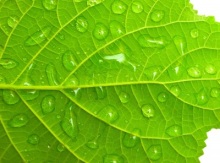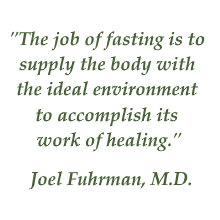Cleansing Diets
A cleansing diet is a nice middle of the road path to cleansing and detox. It's not as disruptive to your life as the more rigid fasting methods, but drastic enough to get, and keep, your attention on a new eating regimen.
For those of us who live with other people, the more rigid fasts like water and the Master Cleanse can upset the whole household, especially if you end up in bed at any point.
While fruit fasting and rice fasting are easier and milder to perform, causing less disruption to your life, a cleansing diet goes a step further. Instead of eating just one food, you eat a variety of natural, wholesome, nutrition-packed foods.
The point is to eliminate the foods that are contributing toxins and possible allergens to your system, including the toxins in microwaved food, and to lessen the quantity and complexity of foods your system must handle.
The effects of cleansing diets are similar to those of fasting
This break from regular heavy eating gives your body a chance to "catch-up" on internal housekeeping, neutralizing and expelling toxins and waste materials, while still allowing yourself a somewhat normal eating routine. You will not detox as quickly as with a more traditional fast, but you will cleanse nonetheless. And it will be much more comfortable than pure fasting.

When you stop eating the foods that are annoying to your body, you not only give your system a rest from the onslaught, lessening the burden, but you also give it a chance to clean up and clean out. A chance to neutralize and eliminate any stored toxins and wastes it was too over burdened to deal with at the time.
Your body, in its infinite wisdom and complexity, can handle these elements, but it needs the appropriate energy and resources to do so.
At first, as some of this stored material is released, you may have mild typical detox symptoms of tiredness, aches and pains, sinus discharge, headaches, nausea -- but much milder than if you were fasting.
You can use dry skin brushing to help facilitate the removal of these toxins. And take 1-2 tablespoons of psyllium husks (a natural laxative and colon cleanser) daily to help clear the colon, or see here for a colon cleanse recipe and more information on psyllium. There are other methods for cleansing the colon, as well.
After a few days you will begin to feel better
than you have in a long time.
This isn't to say that our bodies are "dirty", or "toxic", or "broken". They do a pretty good job of keeping us alive and compensating for all we throw their way (stress, over-eating, lack of sleep, lack of exercise, etc.). Our goal is not so much to "fix" something that's wrong with our bodies, as it is to "get out of the way" of their natural tendency toward health.
Once you get started with a cleansing diet, the break from your normal eating habits will shed new light on why you were eating the way you were, same as a fast.
Several days on a cleansing diet can change your tastes; you'll find yourself naturally drawn to more nutritious, wholesome foods.
Kitchari is an Indian dish often used for cleansing. When used alone as a mono-diet, it's called a kitchari cleanse, but it can be used in conjunction with other wholesome foods as a part of a cleansing diet. The link above has several different kitchari recipes.
Of course, any whole grain, with the exception of wheat, can be an excellent part of a cleansing diet, but be sure to soak the grain first to neutralize the phytic acid so it doesn't interfere with mineral absorption. Wheat can be included once you're sure you aren't wheat-sensitive.
Some cleansing diets, as prescribed, will just sound like good eating sense to you. Fruit for breakfast, salad for lunch, rice and beans for dinner--it's the way we should be eating anyway. Sticking to this routine can, for some, just feel like they're on another "diet".
So shake it up a bit more. Remind yourself it's a cleanse. And not just a physical cleanse, but also a mental, emotional, and spiritual cleanse. Take time to assess your habits in those areas as well. Take time to spend with yourself, to reach inward. To listen quietly to the messages that are always there.
Related Pages
Intermittent Fasting offers several unique
methods for integrating regular fasting into your life.Cleansing Diets offers guidance on using a cleansing diet as a partial fast or as a means of preparation for other types of fasting.
The real benefits of Fasting for Weight Loss, affecting deep and lasting changes in our lives.
Kitchari for Cleansing Information and recipes for using this healthy traditional Indian dish for a fast or for every day meals.
Emotional Benefits of Fasting offers insight on the healing effects fasting has on our emotional and mental patterns.
Recent Posts
-
Valter Longo and the Longevity Diet
Valter Longo's Longevity Diet, which is a fasting mimicking diet, is showing great promise as a prescribed therapy. If you haven't heard of Valter Longo, check out his newly launched website to follow… -
Fasting Overview for Beginners
Information on fasting especially geared toward the beginner. Important guidelines on fasting including the contraindications and how to do a simple one-day fast. -
Meat vs. Vegan | AllAboutFasting
Confusion seems to arise as to whether this site promotes meat-eating or veganism. Let's set the record straight and talk about ideal diets. Ideal for whom? Each of us individually.
